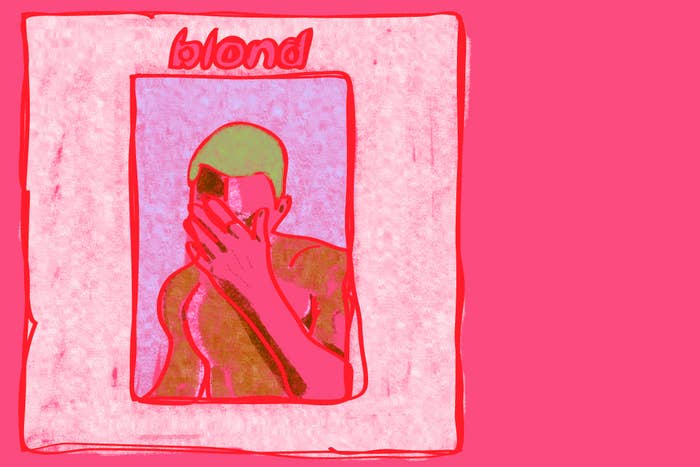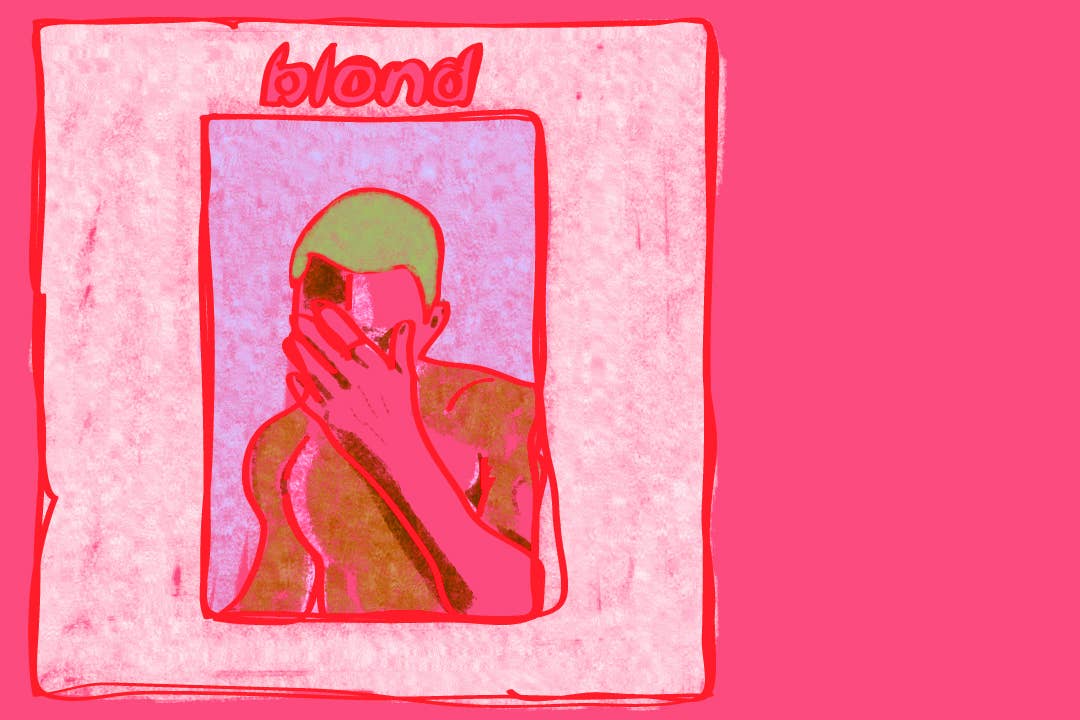
If you were holding your breath for Frank Ocean’s new album, you’d be dead by now. Or more likely, you would’ve passed out after about two minutes and then reawakened. And because more than two million minutes went by since 2012, you could’ve repeated the faint-and-revive cycle more than a million times from the moment Channel ORANGE dropped until now.
Sounds like a productive four years. Cheaper than college.
Ocean’s presumably spent his time better. We knew he was working. We heard about songs completed, saw his Tumblr promises, the in-studiophotos, listened to the song snippets, read interviews with his collaborators. We watched him fart around in a warehouse. And what did we learn from these clues about the release of Boys Don’t Cry? Nothing, really. We thought we knew, but we had no idea. Shout out to The New York Times.
We finally got something on Thursday night. The warehouse stream came back to life, and an album, correction, a 45-minute black-and-white “film by Frank Ocean” called Endless appeared soon after on Apple Music. Ocean then seemed to reward us for our loyalty with a “but wait, there’s more” moment over the weekend when he released a video for the song “Nikes,” sold the Boys Don’t Cry magazine and physical copies of a second album, Blonde, at pop-up stores, then dropped the 17 songs digitally on Apple Music. After all that wait, we now have nearly 107 minutes of music to digest and help carry the story of Ocean’s next chapter beyond the four-year exposition.
Endless is a beautiful but strange experience, starting with the abridged version of the song “Device Control” by German photographer Wolfgang Tillmans (Tillmans also took the cover photo for Blonde, a reveal of Frank with green hair, right hand covering his face). It’s an odd beginning, with Tillmans speaking in a robotic voice about capturing video with an Apple product. The full version of this track appears at the very end of the film, creating mechanical bookends to a project that otherwise seems so human in the middle.
Ocean arrives with a cover of the Isley Brothers’ “At Your Best (You Are Love),” his falsetto thinner than Aaliyah’s but appropriate for this sparse and dreamy rendition with string orchestration credited to Radiohead’s Jonny Greenwood. Greenwood is joined on the collaboration roster by electronic specialists like James Blake, Arca, and SebastiAn, names that might account for the overall slippery, experimental nature of Endless, where the lines of demarcation are fuzzy between tracks.
Sampha makes a brief but stunning vocal contribution on “Alabama,” but it’s Jazmine Sullivan who gives this project emotional weight. “I know you’re in there somewhere,” she sings in a pained voice on “Hublots.” Ocean then leads you into that “somewhere” in his head on “In Here Somewhere,” the electronics glitching and rattling like brain synapses firing while an uncredited female voice, possibly Sullivan’s, offers muffled cries on the outside. It’s no coincidence that the tracks that feature Sullivan—“Alabama,” the gorgeous “Wither,” “Hublots,” and “Rushes”—are the album’s best.
Endless disrupts its own loveliness with bad raps—“El Chapo, de facto/Belle nacho, shell taco, crunch crackle”—and exposed buttholes—“Peace to Moschino, cover your ass, your rectum showing”—on “U-N-I-T-Y.” That song is really the only obvious stain on the album, but even without it, Endless would not have been a satisfactory follow-up to Channel Orange. It’s too much of an art project, pretty but nebulous, much like the warehouse stream that climaxes with our protagonist ascending the spiral staircase he built. Luckily, Ocean also dropped Blonde.
Blonde stirs up questions before the first note plays. If the album is called Blonde, then why is it Blond on the cover? When you’re speaking in terms of nouns, blond is the masculine and blonde is the feminine. Ocean has always played with gender fluidity, and this is no different. The only alternative theory is that someone messed up when inputting the album title somewhere along the way, but better for Ocean to run with the narrative that implies artistic intent.
At its core, Blonde is an album of modern romance, love in the age of technology. It’s a free-floating project, the sound of your head after a handful of painkillers. Ocean spends half of the songs playing with vocal distortion, putting a little distance between himself and his personal lyrics. It’s easy to imagine the distorted moments representing something like a text message, a far more common mode of communication nowadays where the phone and people’s real voices seem so intimidating.
At its core, Blonde is an album of modern romance, love in the age of technology.
There are instances of sex and romance, like on “Skyline To,” where he describes “making sweet love, taking time.” But Ocean more often explores the uncertainties surrounding relationships that are mostly casual until they aren’t. “We’re not in love, but I’ll make love to you,” he says on “Nikes,” while the synthesizers glow and dim in the hazy background. “I’m not him, but I’ll mean something to you.”
“Ivy” appears to move in a sweeter direction—“I thought that I was dreaming when you said you loved me”—until it turns out that Ocean’s talking about unrequited love, and he is on the receiving end—“It’s quite alright to hate me now.” The vocals, supported by a watery electric guitar strum, aren’t subjected to any obvious distortion, though he sounds oddly pinched and younger than he is when he sings, “I ain’t a kid no more,” like a teenager trying to convince his parents he’s old enough to take out the car for a night.
This makes the “Be Yourself” voicemail warning, coming from a woman who may be his mother, fitting. “Don’t try to be someone else,” she warns her college-age child. “When people become weed heads, they become sluggish, lazy, stupid, and unconcerned.” Ocean turns 29 this fall, older than the average undergraduate, but he reminds us that you’re always a kid to your parents, a wise adult to your younger self, and an uncertain mess at present. “I can’t relate to my peers,” he says on “Seigfried.” “I’d rather live outside.” The coming of age story never really ends because we’re always getting older.
The coming of age story never really ends because we’re always getting older.
The tracks here are much straighter shots than anything on Endless, but there’s not a “Thinkin’ Bout You” on this album. “Pink + White” is a pretty piano and bass line walk through a time of cannon balls and climbing trees, with Beyoncé dropping in with some angelic backing vocals. “Solo” has the one hook that might stick in your head—“It’s hell on earth and the city’s on fire/In hell, in hell there’s heaven”—though André 3000’s “Solo (Reprise)” is more memorable, with a frantic rap—about sexism, police murdering kids, rappers not writing their own rhymes—that leaves him less “solo” and more “so low.”
Ocean speaks about his own set of anxieties throughout the album in a less hectic way, save for the rush of “Pretty Sweet.” He calls out Trayvon Martin on “Nikes”—“That n*gga look just like me”—he claims, “They wanna murder a n*gga/Murder me like Selena,” on “Futura Free,” and he says, “Want to see nirvana but don’t wanna die,” on “Nights.”
Mortality is on the brain, as is connection and understanding. “I’ll be honest, I wasn’t devastated,” he sings in a voice filtered through aprismizer on “Close to You,” “But you could’ve held my hand through this, baby.” The personal touch is hard to come by and sometimes either forgotten or devalued in the era of social media, and he gives a story from SebastiAn as an example on “Facebook Story.”
“She told me like, ‘Accept me on Facebook,’” the French producer says about a girl he was dating when the platform first launched. “She starting to be crazy. She thought because I didn’t accept her, she thought I was cheating.” Maybe this is meant to show the absurdity of not believing in your partner’s fidelity without a Facebook declaration, or maybe it’s used as an example of how best to gaslight your girlfriend. Either way, it accomplishes both tasks.
This isn’t a singles album by design (there aren’t really any big memorable hooks and melodies to speak of) or distribution (Apple won’t let you purchase individual songs). But if you had to choose a standout, let it be “Self Control.” This song rolls all of the charms of this project into one: the weird little voice he uses on “Nikes,” the themes of relationships, distance, and bad timing, and sparse accompaniment, this time by an electric guitar. “Wish I was there, wish we had grown up on the same advice/And our time was right,” he says, letting Austin Feinstein and Yung Lean sing the chorus: “Keep a place for me, for me/I’ll sleep between ya’ll, it’s nothing.” Then the strings swell on the bridge and Ocean reminds us he may be the outsider in this situation but he’s not too timid to make demands: “Give up, just tonight.”
Vulnerable as Ocean can be in his music, he’s still a confident, capable artist. There’s been so much talk about how hard the wait for Channel Orange’s follow-up was on fans, but imagine the pressure felt by the artist who keeps the masses waiting. There could be a power trip element to it all, knowing that your fans will stand by you no matter how little you give them.
But four years is also plenty of time to be paralyzed by your insecurities and convince yourself that your work sucks and will never meet anyone’s expectations. That weight could have wrecked a lesser artist, but not Ocean. Instead, he made us wait and proved that sometimes making good art just takes time.

